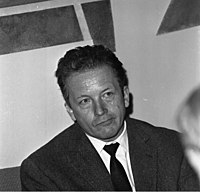| This article needs additional citations for verification. Please help improve this article by adding citations to reliable sources. Unsourced material may be challenged and removed. Find sources: "Klaus von Bismarck" – news · newspapers · books · scholar · JSTOR (March 2017) (Learn how and when to remove this message) |
| Klaus von Bismarck | |
|---|---|
 Klaus von Bismarck, 11 July 1961 Klaus von Bismarck, 11 July 1961 | |
| Born | (1912-03-06)6 March 1912 Jarchlin, German Empire |
| Died | 22 May 1997(1997-05-22) (aged 85) Hamburg, Germany |
| Organisation(s) | Westdeutscher Rundfunk German Evangelical Church Assembly |
| Awards | Knight's Cross of the Iron Cross with Oak Leaves Grand Cross of Merit of the Federal Republic of Germany |
Klaus von Bismarck (6 March 1912 – 22 May 1997) was the Director General of the Westdeutscher Rundfunk (West German Broadcasting) from 1961 to 1976, and the president of the ARD broadcasting association in 1963-1964. He was also the president of the German Evangelical Church Assembly from 1977 to 1979 and a member of its presidium from 1950 to 1995, as well as president of the Goethe-Institut from 1977 to 1989.
During World War II, Bismarck served as an officer in the Wehrmacht. He was a recipient of the Knight's Cross of the Iron Cross with Oak Leaves. According to his memoirs, published in 1992, while serving as an adjutant on the Russian front in 1941 he refused to obey Hitler's Commissar Order to execute all captured Communist political commissars attached to the Soviet Army.
He was a great-great nephew of German Chancellor Otto von Bismarck, and was the son of Gottfried von Bismarck (1881–1928). Klaus von Bismarck was the last owner of the family's estates in formerly German Farther Pomerania, including Kniephof (now Konarzewo, Poland), where Otto von Bismarck spent his childhood.
Bismarck received an honorary Doctor of Theology degree (Dr. h. c. theol.) from the University of Münster. He was one of the eight signatories of the Memorandum of Tübingen which called for the recognition of the Oder-Neiße line as the official border between Germany and Poland and spoke against a possible nuclear armament of West Germany.
Awards and decorations
- Iron Cross (1939) 2nd Class (9 October 1939) & 1st Class (18 June 1940)
- Knight's Cross of the Iron Cross with Oak Leaves
- Knight's Cross on 31 December 1941 as Oberleutnant and leader of the II./Infanterie-Regiment 4
- 669th Oak Leaves on 26 November 1944 as Major and commander of Grenadier-Regiment 4
- Grand Cross of Merit of the Federal Republic of Germany (3 October 1973)
- Grand Federal Cross of Merit with Star (1982)
- Grand Federal Cross of Merit with Star and Sash (2 June 1989)
- Commander of the Order of Merit of the Italian Republic (1989)
References
Citations
- Hesekiel, George (1873). Das Buch vom Fürsten Bismarck (in German). Velhagen & Klasing. Retrieved 13 November 2022.
- Dönhoff, Marion (2 March 1962). "Lobbyisten der Vernunft" [Lobbyists of reason]. Die Zeit (in German). Retrieved 17 November 2018.
- "Das Memorandum der Acht" [The Memorandum of the eight]. Die Zeit (in German). 2 March 1962. Retrieved 17 November 2018.
- ^ Thomas & Wegmann 1992, p. 69.
- Fellgiebel 2000, p. 114.
- Fellgiebel 2000, p. 78.
Bibliography
- Fellgiebel, Walther-Peer (2000) . Die Träger des Ritterkreuzes des Eisernen Kreuzes 1939–1945 — Die Inhaber der höchsten Auszeichnung des Zweiten Weltkrieges aller Wehrmachtteile [The Bearers of the Knight's Cross of the Iron Cross 1939–1945 — The Owners of the Highest Award of the Second World War of all Wehrmacht Branches] (in German). Friedberg, Germany: Podzun-Pallas. ISBN 978-3-7909-0284-6.
- Thomas, Franz; Wegmann, Günter (1992). Die Ritterkreuzträger der Deutschen Wehrmacht 1939–1945 Teil III: Infanterie Band 2: Bi–Bo [The Knight's Cross Bearers of the German Wehrmacht 1939–1945 Part III: Infantry Volume 2: Bi–Bo] (in German). Osnabrück, Germany: Biblio-Verlag. ISBN 978-3-7648-1734-3.
| Knight's Cross of the Iron Cross recipients of the 32nd Infantry Division | |
|---|---|
| Staff | |
| Units |
|
| Presidents of the German Evangelical Church Assembly | ||
|---|---|---|
|  | |
| Intendants of the Westdeutscher Rundfunk (WDR) | ||
|---|---|---|
 Media from Commons
Media from Commons
- 1912 births
- 1997 deaths
- People from Goleniów County
- People from the Province of Pomerania
- Bismarck family
- German Protestants
- German male journalists
- German journalists
- German television journalists
- German Army officers of World War II
- 20th-century German journalists
- Recipients of the Knight's Cross of the Iron Cross with Oak Leaves
- Grand Crosses with Star and Sash of the Order of Merit of the Federal Republic of Germany
- Commanders of the Order of Merit of the Italian Republic
- ARD (broadcaster) people
- Westdeutscher Rundfunk people